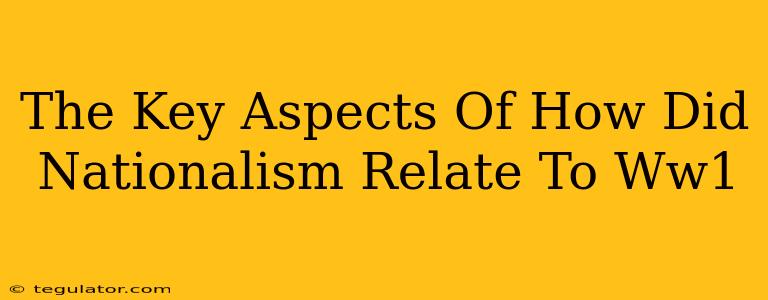World War I, a conflict that reshaped the global landscape, was significantly fueled by the potent force of nationalism. Understanding this relationship is key to grasping the war's origins and its devastating consequences. This article delves into the crucial aspects of how nationalism played a pivotal role in igniting and sustaining the "Great War."
The Rise of Aggressive Nationalism
Before the war, a surge of aggressive nationalism swept across Europe. This wasn't simply a feeling of national pride; it was a belief in national superiority and the right to dominate others. Several key factors contributed to this dangerous escalation:
Competition for Power and Resources:
European powers engaged in a relentless competition for colonies, markets, and resources. This fueled intense rivalries and a zero-sum game mentality, where one nation's gain was seen as another's loss. Nationalist sentiment was cleverly used by governments to justify expansionist policies and bolster public support for military buildup.
Ethnic and Cultural Tensions:
Europe was a patchwork of different ethnic groups and nationalities, many of whom aspired to self-determination and independence. This led to simmering tensions and conflicts, particularly in the Balkans, often described as the "powder keg of Europe." Nationalist movements within empires like Austria-Hungary and the Ottoman Empire challenged the existing order, threatening to destabilize the entire continent.
Militarism and Arms Races:
Nationalist fervor was inextricably linked to militarism. Governments poured vast resources into their armies and navies, fueling an arms race that increased tensions and heightened the risk of conflict. The glorification of military strength became a central element of national identity, further exacerbating the atmosphere of suspicion and hostility.
Nationalism as a Catalyst for War
The assassination of Archduke Franz Ferdinand, heir to the Austro-Hungarian throne, in Sarajevo on June 28, 1914, acted as the spark that ignited the powder keg. While the assassination itself was the immediate trigger, the underlying tensions fueled by nationalism were the true catalyst for war.
Austria-Hungary's Ultimatum and the Domino Effect:
Austria-Hungary, fueled by a desire to crush Serbian nationalism, issued a harsh ultimatum to Serbia. Serbia's partial acceptance was deemed insufficient, leading to Austria-Hungary's declaration of war. The complex web of alliances, largely driven by national interests, then triggered a domino effect, drawing in other European powers. Russia, bound by its Slavic kinship with Serbia, mobilized its troops, prompting Germany, Austria-Hungary's ally, to declare war on Russia and France. Germany's invasion of neutral Belgium further entangled Great Britain in the conflict.
Propaganda and Public Opinion:
Nationalist propaganda played a crucial role in mobilizing public support for the war. Governments used carefully crafted narratives to demonize the enemy and present the war as a righteous struggle for national survival or liberation. This manipulation of public opinion helped to overcome any initial hesitancy towards war and ensure widespread support for the conflict.
The Long-Term Impact of Nationalism on WW1
The war's aftermath tragically demonstrated the destructive potential of unchecked nationalism. The Treaty of Versailles, intended to secure lasting peace, instead sowed the seeds of future conflicts by imposing harsh penalties on Germany and redrawing national boundaries in ways that ignored ethnic realities. The rise of extreme nationalist ideologies in the interwar period ultimately contributed to the outbreak of World War II.
In conclusion, nationalism was not merely a contributing factor to World War I; it was a fundamental cause. The interplay of aggressive nationalism, intense rivalries, ethnic tensions, and militarism created a volatile atmosphere ripe for conflict. Understanding the role of nationalism in triggering the war is essential for comprehending the devastating consequences of unchecked nationalistic fervor and its lasting impact on the 20th century and beyond.

